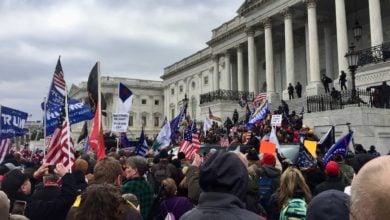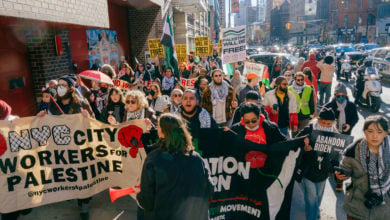On Aug. 11, a sea of red filled
downtown Albany as roughly 1,000 striking Verizon workers and
supporters congregated in front of Verizon’s headquarters demanding
that workers receive fair compensation and a just contract.
Represented by the Communication
Workers of America and the International Brotherhood of Electrical
Workers, 45,000 unionized Verizon workers walked off the job on Aug.
7 in response to Verizon’s attempt to squeeze additional pay and
benefits from its workers.
Despite making $19 billion in profits
in the last four years, and compensating their top five executives
more than a quarter of a billion dollars, Verizon wasn’t satisfied,
deciding to join the growing ranks of union busting businesses while
disguising its motives in the familiar story of necessary cost
reduction in difficult economic times. The problem for them is that
Verizon workers, rightfully, aren’t buying it.
Since the economic crisis of 2008, the
excuse of “necessity” has been the intensifying mantra of the
ruling class, whether in the form of “austerity measures” that
undermine social programs, schools, and public employee pay and
benefits, or as we’re seeing now in the case of Verizon workers in
the private sector.
A cursory glance at the numbers,
however, leaves little room for doubt: there is sufficient money to
meet the needs of workers in all sectors, it’s just that that money
is increasingly concentrated in the hands of fewer and fewer
individuals at the expense of the rest of us. Those who produce
society’s wealth are not being granted their rightful share. If the
character of the Verizon strike and the events in Albany are any
indication of how working people feel about this situation, CEOs and
billionaires should be worried.
Albany CWA and IBEW members have been
picketing around the clock since Aug. 7, stating their position loud
and clear: “No contract, no peace!” and “What’s disgusting?
Union busting!” among other chants, have filled the area
surrounding Verizon headquarters for days. Despite the presence of a
private security company hired by Verizon to intimidate striking
workers, resolve remained strong in the days leading up to the mass
rally on Aug. 11.
Former Verizon technician Kevin
Eitzmann described the importance of this strike as “huge”: “Verizon makes a perfect villain, making billions off workers and
spending it all on lavish compensation for the top five executives.
This is not a company in dire straits and they freely admit their
only driving force is greed. On the other hand, CWA and IBEW have a
long history of militancy and grassroots membership-driven
mobilization—whether it was the 17- week strike in 1989 or
the seven-month strike in ’71. A true win at the Verizon strike could
set a new template for contracts by using an old template, strike.”
A win for Verizon workers could set the
stage for the revival of more militant tactics and allow labor to go
on the offensive.
On
Aug. 11, striking workers were joined by a host of organizations and
individuals who had come to express their solidarity. Even though the
strike was just four days old, representatives of NYSUT, PEF, Save
Our SUNY, United Steel Workers, Teamsters, AFSCME, Citizen Action,
groups of teachers, and others energetically mobilized to join the
mass rally. The broad base of support from public and private sector
workers, student groups, veterans, and grassroots organizations was
reminiscent of the type of solidarity achieved in the Madison, Wisc.,
protests earlier this year. The sentiment at the rally was clearly
that “an injury to one is an injury to all,” and that all
of our struggles are deeply intertwined.
As Colin
Jenkins, an Army veteran and New York State employee put it: “As
working people, we no longer have protections against the devastating
presence of corporate power. Solidarity is all we have left. The
government has failed miserably, so unions are our last vestige of
hope. I realize this, my union brothers and sisters realize
this, and workers all over the country are starting to realize
this. That’s why I am here today.” In Albany, that sense of
solidarity was palpable.
Following the
beginning stages of a lively rally outside of Verizon headquarters,
the 1,000 or so demonstrators made their way through the streets of
Albany to the Crowne Plaza Hotel where Verizon is housing
out-of-state scabs, largely culled from management positions, to
undermine the strength of the strike.
“Scabs go
home!” echoed through the streets, indicting a tactic used by
companies for decades to weaken the power of workers. Demonstrators
then returned to the Verizon building, where representatives of labor
and grassroots groups spoke to the crowd.
Infusing the
moment with a sense of hope and expectant optimism, a speaker from
the Capital District Area Labor Federation suggested that this could
become “our Wisconsin” —in other words, an opportunity for
working people to exert their power and begin to remake society in
the interests of the many instead of the few. This moment does
possess the potential to become another Wisconsin, but only if we
seize it, recognizing that each of our individual struggles is
inextricably linked to those of our brothers and sisters across all
sectors of work and movements for justice and liberation.






